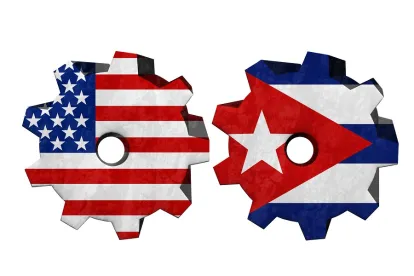The Trump Administration has made good on its promise to cut back on the liberalized Cuban policy implemented by the Obama Administration with a new regime that introduces new travel restrictions as well as broad prohibitions on “direct financial transactions” between persons subject to the jurisdiction of the United States and parties on a new Cuban Restricted List (CRL) that has been published by the State Department.
The New Cuba Restricted List
The new regulations add a new section 515.209 to the Cuban Assets Control Regulations (CACR) prohibiting “direct financial transactions” with parties on the new CRL, which names approximately 180 Cuban entities including 80 hotels all across the island. New section 515.209 is unusual in that it expressly prohibits only “direct” financial transactions, which are further specified as limited to situations where the person on the CRL is either the ultimate beneficiary or originator on a wire, credit card charge, check or payment of cash. This seems clearly to permit indirect transactions, i.e., payments to third parties in Canada, Mexico or Europe that one is aware will later be followed by a separate wire, charge, check or cash payment by that party to a CRL party. Section 515.201(c), however, remains in the CACR and continues to prohibit actions that have the purpose or effect of evading or avoiding the basic prohibitions on dealing with Cuba in 515.210(a) and (b). It remains to be seen, therefore, whether OFAC will view “indirect” transactions with CRL entities as permitted by the expressly limited wording of 515.209 or prohibited by the longstanding evasion and avoidance provision in 515.201(c).
Effect of the CRL on General Licenses
The new regulations also add a new section 515.421 providing that “transactions ordinarily incident to” transactions authorized by general or specific license do not include transactions with those on the CRL if the general or specific license expressly excludes such direct financial transactions. Such an express exclusion has been added to 18 of the General Licenses in subpart 500 of the CACR, which means that whenever a CRL person could be involved it will be necessary to sort through the General Licenses to see whether one is available that does not have the CRL exclusion. This will have an impact on many sectors. It applies, for example, to powers of attorney (515.530), negotiation of contracts (515.534), informational materials (515.545), family visits (515.561), professional meetings and research (515.564), educational and people-to-people travel (515.565), religious activities (515.566), public performances (515.567), activities of private foundations (515.576), imports from Cuba of internet services and software (515.578), and third country conferences (515.581). It also affects financial transactions (515.584) with the exception of transactions for medicine, exports of telecom or internet services for the Cuban people, or the air and sea transport for permissible travel. The CRL exclusion does not apply to several of the General Licenses, for example telecom transactions (515.542), authorized exports (515.559), humanitarian projects (515.575) and insurance (515.580).
Personal Travel
The personal travel rules are changed so that educational travel fitting the rules as of January 27, 2011 is still permitted, but travel not authorized as of that date that became permissible under the Obama Administration’s later rules must now take place with an accompanying person subject to U.S. jurisdiction who is employed by or represents the sponsoring organization, and when there is no tour group, the accompanying representative must have a letter establishing his role on behalf of the sponsoring organization. There is grandfathering of previously arranged travel. There are also additional criteria for people-to-people travel and travel to support the Cuban people. Cuban policy has been to require new hotels to be under Cuban government ownership. As a result, direct booking of travel to Cuba by U.S. travelers is effectively being limited to private accommodations or other lodging one can find that is not owned by a CRL entity. Cruises may gain a notable advantage as a means of visiting Cuba compared to airplane flights since they avoid the hotel problem.
Business Travel
As noted above, the provisions of 515.542 or 515.559, which allow sale of telecom services and specified exports, respectively, are not subject to the CRL exclusion. U.S. persons who market or negotiate such transactions often rely upon 515.534 (contract negotiation) or 515.564 (professional meetings) to travel to Cuba, and those general licenses are now subject to the CRL exclusion. This will pose a significant challenge to U.S. companies seeking to market in Cuba. It is interesting that 515.559 has been left free of the CRL prohibition. It appears that the cross-reference to 515.560(c) in 515.559 is not sufficient by itself to subject the travel authorization in 515.559(d) to the CRL restriction. Travel that fits the specific requirements of section 515.559 (certain types of medical and telecom items) apparently could include CRL hotels.
Financial Transfers to CRLs
The new FAQs published simultaneously by OFAC include this interesting question and answer:
67. Is the U.S. originating bank or U.S. beneficiary bank required to independently verify that a person subject to U.S. jurisdiction is not engaging in a direct financial transaction as defined in § 515.209 when processing Cuba-related transactions?
No. To the extent the transaction involves an entity or subentity on the Cuba Restricted List, a financial institution can rely on the statements of its customer that the transaction is authorized unless it knows or has reason to know the transaction is not authorized. A financial institution is expected to do its normal due diligence with respect to a transaction involving Cuba or a Cuban national.
This FAQ confirms that various CRL transactions (among them, export sales to CRL parties authorized by 515.559) continue to be authorized, and the FAQ goes further by telling banks that they can rely on a customer’s statement that its export transaction is authorized when “normal due diligence” has disclosed no information to the contrary.
Prohibited Officials of Cuba
The Administration’s new regulations also expands the list of “prohibited officials of the Government of Cuba.” That list now has essentially the same scope it had prior to October 17, 2016.
Commerce Department Amendments
The Commerce Department also published new rules and FAQs to implement the new Cuba policy. Commerce has added the CRL parties to its general policy of denial in EAR section 726.2. It also has confirmed that the license exceptions for gift parcels (GFT), consumer communications devices (CCD) and support for the Cuban people (SCP) are not available for persons on the newly expanded list of prohibited officials of the Government of Cuba. Finally, Commerce has simplified and broadened the scope of what can be exported under SCP provided it is for the private sector in Cuba, excluding parties on the CRL. No changes have been made to the list of items authorized for export in paragraph (b) of the CCD exception, and no changes have been made in paragraph (d)(1) of the SCP exception, which allows telecommunications and Internet equipment and related infrastructure equipment to be exported to Cuba, including to entities controlled by the Cuban Government. Entities on the CRL that previously qualified for such exports continue to qualify.
The Trump Administration’s action does indeed find a middle ground between the position of the Obama Administration and the strict embargo that pre-dated the Obama Administration’s opening to Cuba. Quite a bit of U.S. trade will be able to continue, and tourism, especially by cruise ships, will continue, albeit with some new limitations. That said, the number of hotels on the CRL is sure to have a significant impact on the volume and American travel that is not by cruise. The new and unusual prohibition of only “direct financial transactions” is also sure to raise interesting compliance questions for banks and companies dealing with the new rules.



 />i
/>i
